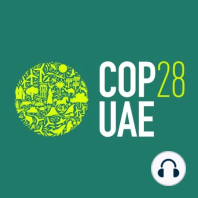2 min listen

Global Cooling Pledge
Global Cooling Pledge
ratings:
Length:
5 minutes
Released:
Dec 5, 2023
Format:
Podcast episode
Description
THE GLOBAL COOLING PLEDGE: BRIDGING THE GAP BETWEENTHE PARIS AGREEMENT AND THE MONTREAL PROTOCOLIn the ongoing battle against global warming, the Global Cooling Pledge emerges as a formidable initiative. Its primary focus revolves around five pivotal areas: nature-based solutions, super-efficient appliances, food and vaccine cold chains, district cooling, and National Cooling Action Plans. The ultimate goal? To provide equitable access to eco-friendly cooling solutions, with a particular emphasis on reaching vulnerable communities.
This initiative, however, is not just about mitigating climate change; it's also about adapting to it. At present, over 1 billion people face imminent threats due to extreme heat, with the majority concentrated in Africa and Asia. Currently, conventional cooling methods, particularly air conditioning, are substantial contributors to global greenhouse gas emissions, accounting for over seven percent. Without effective management, it is forecasted that the energy demand for space cooling could triple by 2050, inevitably amplifying emissions.
Yet, a paradox persists; nearly 2.5 billion people still lack access to climate-friendly cooling solutions, while over 1 billion continue to endure high risks associated with extreme heat. What exacerbates this paradoxical scenario is the very reliance on conventional cooling methods, which significantly contribute to greenhouse gas emissions.
Enter the Global Cooling Pledge, a comprehensive framework that galvanizes governments and stakeholders to take action in those five above-mentioned critical. This multifaceted approach targets the root causes of inefficient and emissions-intensive cooling practices while promoting sustainable alternatives.
Moreover, there is compelling evidence that coordinated international action on energy-efficient, climate-friendly cooling could significantly reduce greenhouse gas emissions - up to 460 billion tons over the next four decades. This reduction is equivalent to eight years of global emissions at 2018 levels, underscoring the substantial environmental gains that can be achieved through a collective commitment to sustainable cooling.Within this context, various policy options come into play, encompassing universal promotion of energy efficiency standards, comprehensive labelling mechanisms, robust building codes, and the establishment of sustainable cold chains. Each of these policy options serves as a vital component of advancing sustainable cooling solutions and contributing to the broader agenda of climate change mitigation.The exponential growth in global demand for cooling is an undeniable reality, with projections indicating a tripling of the number of air conditioning units by 2050. This surge in demand poses significant challenges, as space cooling already accounts for nearly 20% of total electricity usage in buildings. If we fail to implement efficiency improvements, energy demand for space cooling will more than triple by 2050.At the heart of the matter lies the pivotal role of energy efficiency standards for air conditioning. These standards have the potential to dramatically reduce both energy consumption and greenhouse gas emissions. However, their effectiveness hinges on the widespread adoption of high-efficiency appliances by consumers and concurrent innovation by manufacturers. Now, let us logically connect the dots between the Global Cooling Pledge, the Paris Agreement, and the Montreal Protocol, and explore how this initiative serves as a bridge between these significant international accords.The Paris Agreement, a landmark global commitment, sets a clear objective: to limit global warming to well below 2°C above pre-industrial levels, with an aspiration to limit it to 1.5°C. Achieving this goal necessitates substantial reductions in greenhouse gas emissions across all sectors, including cooling.The Global Cooling Pledge steps into this narrative by advocating for energy-efficient and climate-friendly coolin
Released:
Dec 5, 2023
Format:
Podcast episode
Titles in the series (26)
Why is COP28 is Important?: COP28 is important because it is an opportunity for governments to come together and agree on ambitious action to reduce greenhouse gas emissions and adapt to the impacts of climate change. The conference is also a chance for civil society and... by COP28 - 28th Conference of Parties UN COP 28 UAE